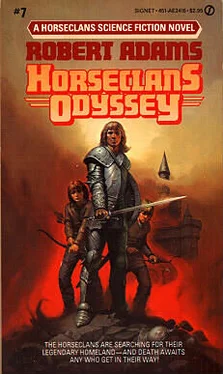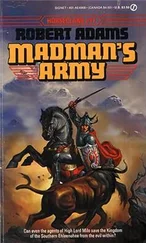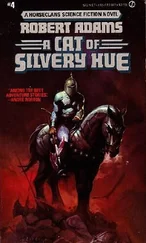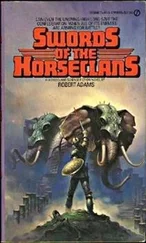Robert Adams - Horseclans' Odyssey
Здесь есть возможность читать онлайн «Robert Adams - Horseclans' Odyssey» весь текст электронной книги совершенно бесплатно (целиком полную версию без сокращений). В некоторых случаях можно слушать аудио, скачать через торрент в формате fb2 и присутствует краткое содержание. Жанр: Фантастика и фэнтези, на английском языке. Описание произведения, (предисловие) а так же отзывы посетителей доступны на портале библиотеки ЛибКат.
- Название:Horseclans' Odyssey
- Автор:
- Жанр:
- Год:неизвестен
- ISBN:нет данных
- Рейтинг книги:5 / 5. Голосов: 1
-
Избранное:Добавить в избранное
- Отзывы:
-
Ваша оценка:
- 100
- 1
- 2
- 3
- 4
- 5
Horseclans' Odyssey: краткое содержание, описание и аннотация
Предлагаем к чтению аннотацию, описание, краткое содержание или предисловие (зависит от того, что написал сам автор книги «Horseclans' Odyssey»). Если вы не нашли необходимую информацию о книге — напишите в комментариях, мы постараемся отыскать её.
Horseclans' Odyssey — читать онлайн бесплатно полную книгу (весь текст) целиком
Ниже представлен текст книги, разбитый по страницам. Система сохранения места последней прочитанной страницы, позволяет с удобством читать онлайн бесплатно книгу «Horseclans' Odyssey», без необходимости каждый раз заново искать на чём Вы остановились. Поставьте закладку, и сможете в любой момент перейти на страницу, на которой закончили чтение.
Интервал:
Закладка:
“In dear Papa’s day and for generations before it, the duchy had been ruled by the duke and the ducal council— membership in which had once been purely hereditary but had become appointive in the time of Papa’s grandpa. “They, the council, to the eternal honor of their gallant souls, tried to oppose the malicious machinations and Schemes of my husband—“ the duchess spat the word— “whereupon they began to die—the younger ones in clearly provoked duels with certain of the duke’s clique; some were found dead in their beds of no clear cause; a few were done to death on the benighted streets, presumably by footpads.
“With more than half the old councilors dead, the rest quickly retired to their estates outside the city, the wisest and most perspicacious pausing only long enough to convert assets into gold, gather their families and pack their transportable goods and flee the duchy entirely. “Those unable or unwilling to flee their ancestral homes and lands finally organized most of the country nobles and gentry and mounted an armed rebellion against the murderous usurper, but it was doomed from its inception; for while almost all of the nobles’ and gentry were well-mounted, well-armed veterans, the bulk of their force was a vast mob of untrained peasantry, all afoot and armed with a miscellany of agricultural implements. Crushed as they were under the heavy taxes levied by the new duke, they could afford but few mercenaries, and those few chose to go over to the duke at a crucial point in the decisive battle on the land northeast of the city.
“Beset with such treachery, the rebels were defeated with terrible losses, Count Martuhn, leaving the very flower of the duchy dead or dying on the field… and much of the precious rootstock, as well, alas.
“Tcharlz and his southern ruffians and forsworn mercenaries pursued the broken columns of survivors for miles, ruthlessly murdering any they caught of gentry or noble houses. But the wretched peasants he simply disarmed, dispersed and sent home, unharmed for the most part.”
Martuhn could detect perspicacity in such a move. After all, hands were needed to work the land, else the whole duchy would starve, and the peasants had likely been forcibly impressed into the rebel army anyway. Under the old system, their mean, dehumanized status would have remained the same no matter who won the rebellion.
The duchess had begun to cough again, even more violently than previously; the spasms went on and on for long minutes and were followed by more minutes of choking and gagging. A white-bearded and stooped physician left his place at the foot of the bed and motioned Martuhn to arise and depart, but the old duchess would have none of his attempt to exercise authority. The deathly-ill woman flopped weakly back against the piled mound of cushions’, but—though she perforce must speak through a mouthful of blood and mucus which dribbled the while down her chin to drip onto her bodice— her voice was as strong as ever.
“Count Martuhn, keep you your place. And you, you blathering old imbecile, get out of here! See you now how much good was done me by all the nauseous doses you made me swallow? By the unholy messes of oils and herbs you made me endure? If you must be active at something, fetch me that Zahrtohgahn, Master Ahkmehd. His drugs can at least render my death easier.”
“Hush, your grace, hush,” murmured the lady who bent to wipe the duchess’ lips and chin. “You are very ill, true, but you are not… are not dying.” “Nonsense, Mahrtha!” The duchess patted the freckled hand of the red-haired woman tending her. “I know it and so do you; I’m dying, all right. But my consolations are that the ravening beast who dishonored us both and most of the duchy as well is dead before me and most of his jackals with him, and that this birthright of mine will finally pass into the strong, capable hands of the kind of man Papa should have found for me to marry—this man, Count Martuhn—and I mean to live until I can tell him what he needs to know if he to rule long and wisely over my people.”
When Martuhn finally left the chamber of the dying duchess, he was of two minds about the late duke. He did not doubt that the non-bereaved widow was telling the whole and unvarnished truth… as she had perceived it. But still he felt admiration for much that Tcharlz had done for the duchy—however he had come to the ascendancy—and was he, Martuhn, to rule here, he could discern little or no reason to go back to the old order and ways, which was what the duchess had been advising in a roundabout way.
Insofar as Duke Tcharlz’s personal habits were concerned, the duchess, who obviously had been reared in a sheltered and insulated environment by an adoring and overly indulgent sire, might be shocked to her innermost core, but Martuhn had known or known of far worse lechers than her dead husband. His hereditary overlord, Duke Lin of York, for example, had set aside his wife to take up the violent rape of three or four young virgins a week; and as he had gotten older, the victims he chose were younger, with many of the prepubescent children dying as a direct result of his abuse of their immature bodies. At length the monster had been overthrown and slain by some thoroughly disgusted nobles, and Martuhn had lost his patrimony in the ensuing dynastic struggles. That the late duke had poisoned (or smothered; there was more than one tale of old Duke Myk’s demise abroad) his father-in-law, long years agone, did not sound at all like the man Martuhn had known and respected, even while opposing him in the matter of Bahb and Djoh Steevuhnz. Besides, it had never been aught save suspicions mouthed by men and women who actively and openly hated and despised Tcharlz on other grounds; no one, not even her grace, had ever possessed a shred of hard evidence.
The deaths of so many of the councilors of the preceeding duke were another matter, of course, but here again the personal, straightforward stamp of Tcharlz just would not adhere, in Martuhn’s mind, to poisonings or garrotes and envenomed daggers in the dark. So what really had happened in those distant days was anybody’s guess. Most likely, Martuhn reasoned, some or all of them had been slain by Tcharlz’s then retainers, but probably not on his direct orders. The way that Tcharlz had summarily broken the power of the nobles and gentry—seizing their hereditary lands and thereby so impoverishing them that their only options were to cleave to him, flee the duchy or slowly starve—had, in Martuhn’s opinion, been a stroke of rare genius; and that Tcharlz had not then—as many a high noble would have done—parceled out the seized lands to supposedly loyal new landlords, but had rather freed the peasantry and redistributed the land to them to own and work had without question immeasurably richened and strengthened the duchy. And that he had done precisely the same to those lands he formerly had ruled as a count had proved that it was not simply a punitive action but part of a carefully conceived plan. Of course, the actions and the suddenness with which they had been taken were very hard on the affected landlords— upon whose sufferings, admittedly pitiable, the stricken duchess had dwelt at length. But the overall outcome had been good and more than good. The lands were now more productive than ever they had been. The majority of the nobles and the gentry were unswervingly loyal to the overlord (so loyal, in fact, that the vast proportion of those of fighting age had gone down to death behind Tcharlz’s banner at Traderstown) and the peasants-cum-yeoman-farmers had proved time and again where lay their allegiances.
But there were those nagging other things haunting the honor and the honest soul of Martuhn, and not solely because of the fevered accusations of the dying duchess. Despite the wholly admirable system of laws, law courts and judges instituted by Tcharlz to replace the ancient hodgepodge he had inherited, the captain had heard rumors as long as he had been a resident of the duchy that—were a large enough sum paid to a high enough authority—favorable judgment in duchy courts could always be purchased.
Читать дальшеИнтервал:
Закладка:
Похожие книги на «Horseclans' Odyssey»
Представляем Вашему вниманию похожие книги на «Horseclans' Odyssey» списком для выбора. Мы отобрали схожую по названию и смыслу литературу в надежде предоставить читателям больше вариантов отыскать новые, интересные, ещё непрочитанные произведения.
Обсуждение, отзывы о книге «Horseclans' Odyssey» и просто собственные мнения читателей. Оставьте ваши комментарии, напишите, что Вы думаете о произведении, его смысле или главных героях. Укажите что конкретно понравилось, а что нет, и почему Вы так считаете.












